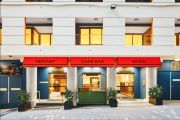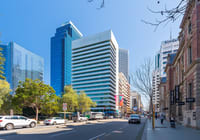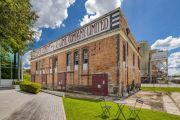
Why a 1.4pc return is great news for the office market
Some unlisted office-only funds are delivering positive returns to start the new year in a reprieve for the office sector after more than two years of steep valuation writedowns.
Mirvac Wholesale Office Fund, Lendlease Prime Property Fund and ISPT’s 50 Lonsdale Street Trust delivered positive returns during the three months to December.

It marked the first time since March 2023 that an office fund with more than one asset experienced capital growth, according to the MSCI/Mercer Australia Core Wholesale Monthly Property Fund Index.
“There were some office funds that had positive returns, while some had high negative returns, which is an indication that it’s now about the individual assets held rather than asset type,” MSCI’s Benjamin Martin-Henry said.
“The spread between the funds is another indicator that the office market – especially in Sydney, Brisbane and Perth – is past the worst of it.”
The index tracks the major wholesale property funds that own Australia’s top office towers, shopping malls and warehouses.
Lendlease’s fund was the best-performing office fund in the final quarter of 2024, providing a return of 1.4 per cent. It owns a stake in the tightly held office towers located at Sydney’s 1 Farrer Place: Governor Phillip Tower and Governor Macquarie Tower.
The Mirvac Wholesale Office Fund – which delivered a positive 0.7 per cent return – holds stakes in some of the Sydney CBD’s most coveted towers in Quay Quarter Tower and the former AMP building, which is undergoing a $200 million revamp.
The refurbishment of the former AMP building, located at 33 Alfred Street, has been well received by corporate Australia with a slew of blue-chip tenants committing to move into the building. Its tenants will include BlackRock and a string of top-tier law firms, including Allens, A&O Shearman, Lander & Rogers, Maddocks and Pinsent Masons.
Mr Martin-Henry said the green shoots of a turnaround performance from three office funds indicated that the value of “prime grade” towers in certain markets had finally bottomed, and a rebound in value could occur as early as the latter half of this year.
However, all office funds still delivered negative returns across the entirety of 2024 from valuation writedowns still flowing through. In some office markets, such as Melbourne, valuation writedowns are expected for another 12 months.
Overall, the MSCI/Mercer Australia index recorded a 12-month total return of negative 6.4 per cent, driven by office funds experiencing a capital decline of 17 per cent.
Funds holding other types of commercial property, such as industrial and retail funds, achieved positive total returns for 2024. Retail funds performed the strongest, achieving capital growth of 3.4 per cent last year.
According to JLL senior retail investments director Nick Willis, shopping centre transaction volumes were 14 per cent above the prior three-year average.
“Over 2024, Australia’s retail market experienced a resurgence of optimism, driven by the renewed interest of local REITs and wholesale funds, following several years of subdued activity,” Mr Willis said.
With interest rate cuts potentially on the cards for later this year, which would increase disposable income and subsequent spending on discretionary items, larger shopping centres were expected to perform more strongly, Mr Martin-Henry said.
“Regarding the retail sector, with two consecutive quarters of positive capital growth, the sector is now in its recovery phase,” he said.
Citi analysts took the same view earlier this week, arguing that Scentre Group was poised to benefit from “healthy underlying” consumer demand and a reduction in borrowing costs from potential interest rate cuts. In coming to that conclusion, the investment bank lifted the retail landlord to a “buy” rating from “neutral”.











